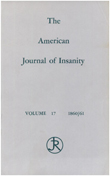The glutamatergic basis of human alcoholism
Abstract
OBJECTIVE: Although alcoholism is one of the most common psychiatric diagnoses, understanding of its pathophysiology remains poor. Accumulating evidence suggests that neurophysiological and pathological effects of ethanol are mediated to a considerable extent through the glutamatergic system. This article reviews the evidence of ethanol's effects on glutamatergic transmission and proposes a glutamatergic basis for alcoholism. METHOD: The information was derived from original research. The authors located more than 100 articles from psychiatry and neuroscience journals that related ethanol to glutamatergic transmission. They critically reviewed the neurobiology of the glutamatergic system in alcoholism and synthesized a unifying glutamatergic theory. RESULTS: Acute effects of ethanol disrupt glutamatergic neurotransmission by inhibiting the response of the N- methyl-D-aspartate (NMDA) receptor. Prolonged inhibition of the NMDA receptor by ethanol results in development of supersensitivity; acute removal of ethanol causes marked augmentation of activity of postsynaptic neurons, such as those in the noradrenergic system, and, in the extreme, glutamate-induced excitotoxicity. Neurobiological effects of alcoholism, such as intoxication, withdrawal seizures, delirium tremens, Wernicke-Korsakoff syndrome, and fetal alcohol syndrome, can be understood as a spectrum of consequences of ethanol's effect on the glutamatergic system. CONCLUSIONS: A host of findings support the hypothesis that the unifying mechanism of action of ethanol in interference with glutamatergic neurotransmission, especially through the NMDA receptor. Alcoholism may be considered another member of the expanding family of glutamate-related neuropsychiatric disorders. These insights should increase understanding of the biologic vulnerabilities leading to ethanol abuse and dependence and aid development of more effective pharmacologic interventions.
Access content
To read the fulltext, please use one of the options below to sign in or purchase access.- Personal login
- Institutional Login
- Sign in via OpenAthens
- Register for access
-
Please login/register if you wish to pair your device and check access availability.
Not a subscriber?
PsychiatryOnline subscription options offer access to the DSM-5 library, books, journals, CME, and patient resources. This all-in-one virtual library provides psychiatrists and mental health professionals with key resources for diagnosis, treatment, research, and professional development.
Need more help? PsychiatryOnline Customer Service may be reached by emailing [email protected] or by calling 800-368-5777 (in the U.S.) or 703-907-7322 (outside the U.S.).



